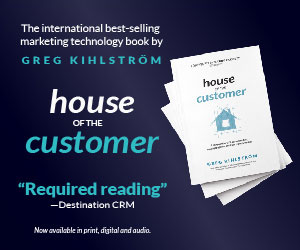Do you know what your organization’s marketing technology infrastructure looks like? If not, you may want to do some research and take a closer look. While it is commonly assumed that the responsibility of marketing technology lies solely with the CMO or other applicable positions in large companies, understanding its significance should be something everyone within an organization has knowledge on. After all, modern marketing practices rely heavily upon the use of efficient and robust technologies; failing to have these figures in place can inhibit growth opportunities and put competitive advantage at risk.
In this article, I will explore why executives need to understand their company’s marketing technology infrastructure and how easy it is – even for non-marketers -to gain familiarity on essential trends shaping successful campaigns today.
Why should non-marketing leaders should understand marketing technology
Marketing technology, also known as MarTech, is a suite of digital tools designed to streamline and optimize marketing efforts. Its purpose is to bring all aspects of marketing together in one place, making it easier for businesses to create and execute targeted campaigns. While it may sound like a topic strictly for marketers, non-marketing leaders should also have a basic understanding of MarTech. This is because technology is now an essential component of any business strategy. By mastering MarTech, non-marketing leaders can better understand the customer journey and leverage data-driven insights to make informed business decisions. Additionally, marketing and sales teams can work together more effectively, resulting in increased ROI and revenue growth.
The benefits of marketing technology for non-marketing leaders
Gone are the days when marketing technology was just for the marketing department. Today, non-marketing leaders can benefit greatly from incorporating marketing technology into their businesses.
This can range from sales and customer experience, to customer service and more. With marketing technology, leaders can better understand their target audience, improve customer experiences, and streamline their operations. By utilizing data-driven insights, non-marketing leaders can make informed decisions that positively impact their bottom line. Additionally, marketing technology can help leaders stay competitive in a rapidly evolving market. With so many benefits at your fingertips, now is the time to explore the power of marketing technology and how it can transform the way you do business.
Common obstacles preventing non-marketing leaders from understanding marketing technology
Marketing technology has become an increasingly important aspect of business in the digital age. However, many non-marketing leaders may struggle to fully comprehend this complex field. One common obstacle is the technical jargon used in the marketing industry, which can be confusing and overwhelming for those outside of the field. Another challenge is keeping up with the rapidly changing digital landscape and the latest technologies, as it requires a significant investment of time and resources.
Additionally, there may be a lack of alignment between marketing goals and business objectives, making it difficult for non-marketing leaders to understand the value of marketing technology. By recognizing these obstacles, organizations can take steps to bridge the knowledge gap and ensure that all leaders are equipped to make informed decisions about marketing technology and its impact on the business.
Steps to building a better understanding of marketing technology for non-marketing leaders
In today’s business world, marketing technology is becoming increasingly important for companies to stay competitive. As a non-marketing leader, it may feel overwhelming to try and understand these new tools and strategies. However, taking the time to learn about marketing technology can lead to big payoffs for your organization.
One place to start is by attending industry events or conferences, where you can hear from experts and network with other professionals. Another option is to work closely with your marketing team, asking questions and seeking to understand their goals and methods. By taking these steps to build your understanding of marketing technology, you can become a more informed and valuable member of your organization.
How to develop an action plan for leveraging marketing technology in your organization
In today’s digital age, technology has become an integral part of marketing strategies for any organization. However, simply having the latest tools and software is not enough. It is crucial to have an action plan in place that leverages this technology to achieve your marketing goals effectively. Developing an action plan involves identifying the most critical areas of your marketing strategy that can be optimized with technology and defining clear objectives. It also requires understanding the current market trends, examining the competition and identifying potential risks.
Once you have a clear understanding of your marketing goals and the role technology can play in achieving them, it’s time to prioritize and allocate resources to execute your plan. Through this process, your organization can stay ahead of the curve and attain marketing success by leveraging the power of technology.
While marketing technology may seem relegated to a specific area of the business, it can help many different parts of the organization better understand customers, pre- and post-sales behavior, and much more. With the right information and support, non-marketing leaders can quickly grasp not only why it’s important to understand, but how best to utilize it in their organization. After all, with the help of marketing technology solutions, non-marketing leaders can save time and money as well as more clearly define and track objectives as they seek to foster growth for their businesses.
By understanding what marketing technology is available, non-marketing leaders can become more agile in responding to market changes that are needed for their organizations’ success.
Original Source:
Blog – GK5A – Agile Business Transformation
Original URL:








